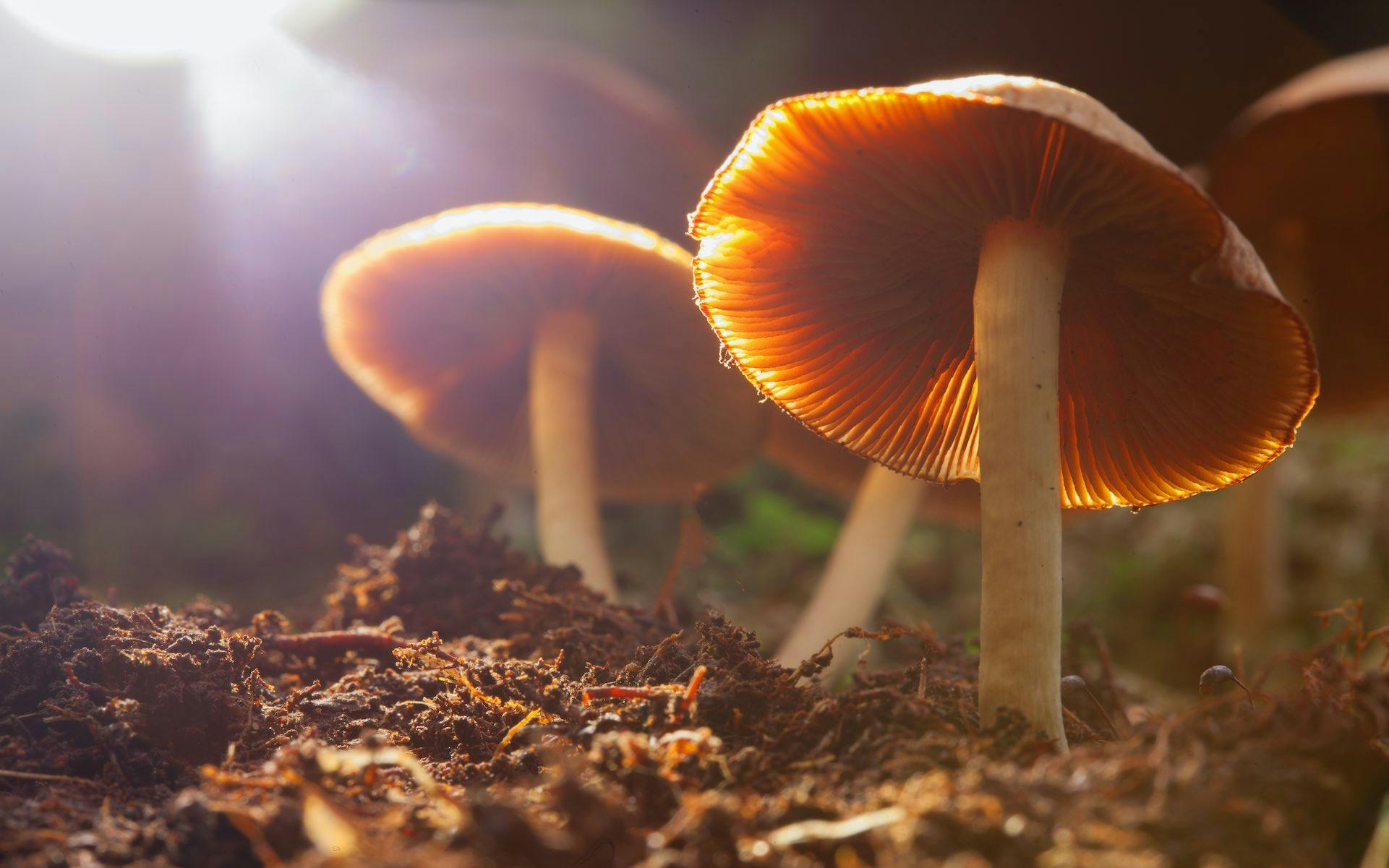Written by Emma Stone

Medicine is entering a new paradigm, with psychedelics paving the way forward. A renaissance in psychedelic research is shaking off the stigma that marred these compounds for decades and is uncovering the incredible versatility of these potent, often plant-derived, medicines.
Psychedelics appear to be incredibly transformative in treating mental health conditions that are often resistant to conventional treatments. In the US alone, 19% of adults experienced a mental illness from 2017-2018—and experts predict that COVID-19 has further exacerbated the current state of mental health. The search for safe and effective treatments that sustain results has never been more pressing.
With many individuals experiencing profound and life-changing benefits following just a single dose of psychedelic treatment, the sheer therapeutic potential of these compounds cannot be underestimated.
How long have we known about the benefits of psychedelics?
Psychedelics have been revered by cultures the globe over since time immemorial, with records of their use immortalized in art, sculpture, and story. However, a specific focus on the medical applications of psychedelics first emerged in the mid-twentieth century. Between the 1950s and mid-’60s, scientists made rigorous inroads into psychedelic medicine and its therapeutic uses.
More than 1,000 clinical papers were published containing data on 40,000 patients who had been administered psychedelic medicine during those decades. These intrepid studies were led by key figures in the movement such as scientists Stanislav Grof, Timothy Leary, and Richard Alpert, who later became counterculture icon Ram Dass. Collectively, these trailblazing scientists investigated psychedelics as a novel treatment for addiction, alcoholism, and mental illnesses, but also probed their effects on metabolism, time, and perception.
After the passage of President Nixon’s Controlled Substances Act in 1970, psychedelics became classified as a Schedule 1 substance and research slowed to a trickle. Fast forward to the present day and that trickle is becoming a torrent again, with scientists investigating an even broader, impressively diverse range of uses for psychedelic compounds.
When the ego network is temporarily taken offline, new neural connections form in parts of the brain, allowing for novel insights and ways of seeing the world, which can release unhelpful or negative thoughts and behavioral patterns.
The medical benefits of psychedelics
One of the defining therapeutic characteristics of psychedelics is that they can enact almost instantaneous change. “Psychedelic compounds are fast-acting when compared to traditional pharmacological therapies,” said Dr. Lonny Weiss, an integrative psychologist who works with psychedelic treatment. “In some cases, they work after one administration, whereas antidepressants can take up to 6 weeks to reach maximum efficacy, if they work at all.”
What’s more, a little can go a long way. Many individuals experience benefits from tiny doses, known as microdoses.
“Microdosing refers to the use of small amounts of psychedelics to achieve the benefits of ego dissolution, without the intoxication and impairment of a full dose,” said Weiss. “People report increased creativity and insight, as psychedelics at these levels make us good observers of insights.”
The default mode network
A unique effect of psychedelics is their suppression of the brain’s default mode network (DMN). “The default mode network refers to internal structures of our brain that are related to the way that we think and talk to ourselves, and includes the centralization of brain functioning—that is often referred to as the ‘ego,’” explained Weiss.
The suppression of the default mode network allows a person to see things from a different and fresh perspective. “As the neurotic self-talk is quieted by the psychedelic substance, our brain functioning is decentralized, which allows for new connections to be forged between brain structures,” said Weiss.
Neuroplasticity and neurogenesis
Yet another therapeutic benefit of psychedelics are their effects on neuroplasticity and neurogenesis: Neurogenesis is the creation of new neurons and connections in the brain. Neuroplasticity is how the brain changes and rewires itself in response to new stimuli. In healthy brains, neurogenesis occurs throughout life to help support memory, learning, and protect the brain from stress.
Enhanced neurogenesis and neuroplasticity have been linked to improved mental health, and many psychedelic drugs increase both neuroplasticity and neurogenesis. Experts have pointed out that psychedelics may be ideally positioned to treat psychiatric disorders by stimulating connectivity and integration across the brain and boosting neurogenesis. A 2021 meta-analysis found that psychedelics improved mood in both healthy volunteers and those with depression.
Research has shown that psychedelics also increase the growth and density of neurons in the brain and activate new neural pathways safely, a feat few compounds are capable of achieving. In this way, psychedelics can also help healthy individuals looking to reframe their perspective—they don’t just treat illness, but can also optimize brain function.
A sense of connectedness
Trippers also commonly report that psychedelics bring them closer to an understanding of the divine. Some describe this experience as a sense of connectedness to everything, feeling like time disappears, the loss of ego, and profound positive emotions.
“Psychedelics are illegal because they dissolve opinion structures and culturally laid-down models of behavior and information processing. They open you up to the possibility that everything you know is wrong.” — Terence McKenna
In the words of the late Daniel X. Freedman, pioneer of LSD research:
“One basic dimension of behavior… compellingly revealed in LSD states is ‘portentousness’— the capacity of the mind to see more than it can tell, to experience more than it can explicate, to believe in and be impressed with more than it can rationally justify, to experience boundlessness and ‘boundaryless’ events, from the banal to the profound.”
When the ego network is temporarily taken offline, new neural connections form in distinct parts of the brain. These new networks allow for novel insights and ways of seeing the world, which can release unhelpful or negative thoughts and behavioral patterns.
The long-term benefits of a psychedelic experience
These perception-altering experiences can be transformative, carrying long-range benefits.
A May 2020 study in the journal Human Psychopharmacology suggested that psychedelic experiences deliver enduring improvements in mental outlook and attitude. Transformative trips can offer individuals with depression, anxiety, or addiction a new lens through which they can refocus their views of themselves, their lives, and their relationships with others.
The benefits of psychedelics have long been promoted by Terence McKenna, the psychedelics lecturer, researcher, and author. McKenna was also a psychonaut—a psychedelic explorer who plumbed the depths of his own consciousness in a quest to understand the self and mind. For McKenna, psychedelics offer a diving board into a more conscious state, to shake up the status quo. He once quipped:
“Psychedelics are illegal not because a loving government is concerned that you may jump out of a third-story window. Psychedelics are illegal because they dissolve opinion structures and culturally laid-down models of behavior and information processing. They open you up to the possibility that everything you know is wrong.”
Which conditions can benefit from psychedelic treatment?
A growing number of clinical studies indicate that psychedelic medicine may represent a powerful treatment for an impressive range of conditions. An extensive 2016 review of medical literature on psychedelics concluded that they are considered physiologically safe, with no evidence that they lead to dependence or addiction.
The review exploring the therapeutic value of psychedelics found benefits for individuals living with:
- Anxiety
- Treatment-resistant depression
- Obsessive-compulsive disorder
- Alcoholism
- Nicotine addiction
- Substance use disorder
- PTSD (post-traumatic stress disorder)
- Autism
- Psychosis
- Personality disorders
- Cluster headaches
- Glaucoma
The sky appears to be the limit when it comes to the novel applications of psychedelics. There’s even early evidence to suggest psychedelics may represent an innovative treatment for other issues such as obesity and central nervous disorders such as Alzheimer’s and Parkinson’s.
Scientists are also investigating the properties of psychedelics for treatment of autoimmune diseases. Psychedelics may influence immune functions by modulating the gut microbiome, which influences physiological pathways involved in stress and could improve stress responses.
In particular, there is considerable clinical evidence to support the use of psychedelic treatment for the conditions below.
Anxiety, depression, and treatment-resistant depression
Classical psychedelics such as ayahuasca, psilocybin, and LSD have been found to produce significant and sustained antidepressant and anti-anxiety effects. A 2019 systematic review found that psychedelics significantly reduced symptoms in individuals with depression and anxiety. The treatment was well-tolerated with no persistent adverse effects.
Psychedelics also appear to be particularly helpful for individuals with treatment-resistant depression. A 2018 randomized controlled trial found that ayahuasca caused a significant and rapid antidepressant effect in a population of individuals with major depressive disorder when compared with placebo.
Addiction/Substance use disorder
Psychedelic agents have shown immense promise in healing substance use disorders, such as alcohol dependence, nicotine addiction, and even opioid addiction. Specifically, there’s evidence that psilocybin reduces alcohol and tobacco use in individuals suffering from these specific addictions.
Ketamine has also been used as a successful treatment for heroin addiction, reducing cravings and self-administration. Ketamine has additionally shown promise in prolonging abstinence from alcohol. While scientists still haven’t firmed up exactly how ketamine works, they’ve identified enhanced neurogenesis and neuroplasticity, treatment of depressive symptoms, blocked reconsolidation of drug-related memories, and disruption of the default mode network (DMN) as some likely mechanisms.
Other psychedelics, such as ayahuasca, have also shown promise in the treatment of addiction.
PTSD
PTSD is a chronic and often treatment-resistant condition. Individuals with PTSD are often at an increased risk of suicide, mental health conditions, cardiovascular disease, and cognitive impairment. However, psychedelic treatment represents a safe, effective alternative. In 2017, the FDA granted breakthrough therapy designation for MDMA-assisted psychotherapy for PTSD.
Data from clinical trials indicate that MDMA-assisted psychotherapy represents a substantial improvement over common pharmacotherapies, such as paroxetine and sertraline, with respect to safety and efficacy.
End-of-life care
Psychedelics can greatly improve palliative, or end-of-life, care as well. A 2016 study carried out by scientists at John Hopkins University confirmed that psilocybin can substantially ease the depression and anxiety of patients living with life-threatening cancer. High doses of psilocybin also led to increases in quality of life, meaning of life, optimism, and diminished existential anxiety about death.
Approximately 80% of participants were still experiencing these positive changes at their 6-month follow-up visit. Of these, 80% reported a moderate to greater feeling of well-being, and life satisfaction in self, mood, relationships, life in general, and anxiety.
How are psychedelic treatments administered?
Experiencing psychedelic treatment in a safe setting and under the guidance of an experienced practitioner may enhance the likelihood of a positive and safe experience and is highly recommended.
“Patients seeking this treatment should be screened for psychosis and trauma,” advised Weiss. “Psychedelics are powerful substances, and if misused they can cause psychological harm.”
During the 1950s and ‘60s the CIA conducted several studies that ultimately demonstrated the importance of set and setting. The underlying intention of those studies was not to investigate the therapeutic use of psychedelics, but rather to break down a person’s mind and control them. “The findings are important and illustrate the need for a mindful approach and strategy in the use of psychedelics,” emphasized Weiss.
The importance of set, setting, and intention
Psychedelic treatments are, therefore, most commonly delivered in conjunction with therapy. Clinical results of this approach have shown safe and effective outcomes particularly for treatment-resistant conditions. “Research has shown the need for set, setting, and intention when using these substances,” explained Weiss. “Set refers to the mindset of the person who is about to use the substance, setting refers to the environment where the substance will be used, and intention refers to what a person intends to achieve while using these substances.”
Two general forms of treatment have evolved: psychedelic-assisted psychotherapy and psychedelic integration therapy. “Psychedelic-assisted psychotherapy involves the use of the substance while a clinician is working directly with the patient,” said Weiss. “Psychedelic integration therapy takes place after the substance has been used, and involves the process of taking insights gained from the psychedelic experience and implementing them into a person’s life.”
While the transformational insights gained from the use of psychedelics are temporary, therapeutic integration sessions can assist people in having a transformational experience.
According to Weiss, the therapy sessions support the patient to experience insights that can be applied as behavioral changes. “The word ‘psychedelic’ translates to ‘mind-manifesting,’” he said. ”Western medicine has given us the fallacy of a cure. In many cases, however, we must do the work in order to achieve great change.”
By providing us with your email address, you agree to Leafly's Terms of Service and Privacy Policy.



